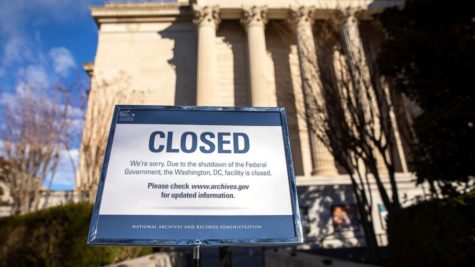Are There Two Sides to Every Story?
Famed News Anchor and “Most Trusted Man in America” Walter Cronkite long represented integrity in America and its journalism. Photo Courtesy of BBC
There was a time when discourse was civil, respectful and honest. One could argue that was at its peak in the time of Walter Cronkite, others could say that was when the world was still pre-industrial and news was largely consumed through hearsay or through newspapers.
The common theme between either period is that people were left to their own devices to come to conclusions, nobody was there to tell them what to think. The TV wasn’t on all the time, nor was news, so they were given a chance to process information on their own.
They were presented the facts as they knew them, which could easily have been manipulated or changed by whoever owned the medium of dispersion, and were left to come to their own conclusions.
Now society both presents the wrong facts and tries to persuade people into where they should go.
There is now a constant strife between people claiming the world is inundated with information, the people disseminating that information and the people who actually sift through it all.
An integral piece to the equation is fake news, which is both a perception and a reality about the way society is currently given information.
The definition of fake news means different things to different people. However, the common agreement is that fake news is published information that is utterly, and sometimes deliberately, false. This is often given with a political stipulation, that those who distribute fake news do so to further their own personal agenda.
Frequently, specific sections of the political spectrum, including the president, use it to discredit their political opponents.According to The Guardian, in late 2017 President Donald Trump refused to answer a question from a CNN reporter (a practice he continues to this day) due to a recently published report.
When asked a question by CNN’s Jim Acosta, Trump said,
“I’m not going to give you a question. You are fake news.”
It is the fact that the phrase is spoken directly to the media by the President of the United States that creates the distrust in the press society now has.
Sources that are perceived as biased because they report facts in line with a certain debate are discredited and categorize the outlets and readers as partisan and therefore invalid.
This means that debates on policy are no longer had within the realm of facts and judgement, but rather an emotional dismissal of the things that prove oneself wrong.
The prevailing opinion among those who laud themselves for being reasonable is that the solution is to deliberately check sources on “both sides” of a debate. This leads to an even worse interpretation of the given events by treating everything as black and white and allowing facts to be left up to interpretation.
A commonly accepted phrase for this idea is the term: “a view from nowhere.” The view from nowhere (a phrase coined by Thomas Nagel in his1986 book) is a concept in which an individual or outlet bases their understanding of an event on an arbitrary middle ground between either party of a debate instead of the actual events or facts of the case.
For example, in Aaron Sorkin’s television series “The Newsroom” a staffer uses a hypothetical congressional debate to describe the view from nowhere. In it, two congressmen get into an argument. One claims the earth is flat and the other argues that the earth is, in fact, round. Instead of printing “Congressman Claims the Earth is Flat” a view from nowhere would state “Congressmen have a debate about shape of earth.” This is the issue that has polluted western journalism for decades.
Outlets are so obsessed with becoming unbiased, that they in themselves have an inherent bias to being “impartial” instead of being honest.
New York University professor Jay Rosen, an opponent the fallacy of unbiased news described a pattern in prolific United States news outlets of actively removing people from their staff who are perceived as being biased.
In a self-conducted interview, Rosen said,
“When MSNBC suspends Keith Olbermann for donating without company permission to candidates he supports– that’s dumb. When NPR forbids its ‘news analysts’ from expressing a view on matters they are empowered to analyze– that’s dumb. When reporters have to ‘launder’ their views by putting them in the mouths of think tank experts: dumb. When editors at the Washington Post decline even to investigate whether the size of rallies on the Mall can be reliably estimated because they want to avoid charges of ‘leaning one way or the other,’ as one of them recently put it, that is dumb. When CNN thinks that, because it’s not MSNBC and it’s not Fox, it’s the only the ‘real news network’ on cable, CNN is being dumb about itself.”
Although it would seem as though they’re attempting to clear themselves of bias, in actuality, they’re suppressing people for doing what people do, have opinions. However, it’s not just about people being stopped for having opinions, it’s that bias against opinions prevents good voices from doing important, and fact-based work.
Often times, that work, when done correctly, doesn’t strictly stay within the confines of being “unbiased.”
Famed news anchor and “Most Trusted Man in America” Walter Cronkite, who was a beloved vessel of information to the nation for decades, took a stand publicly about the failure of the United States during the Vietnam War.
After a trip to Vietnam, where he witnessed soldiers burn down civilians homes, he said,
“It seems now more certain than ever that the bloody experience of Vietnam is to end in a stalemate . . . It is increasingly clear to this reporter that the only rational way out then will be to negotiate, not as victors, but as an honorable people who lived up to their pledge to defend democracy, and did the best they could.”
This was largely considered to be something that turned the tide of our involvement war and later led to President Lyndon B. Johnson to not run for his second term in 1968.
If Cronkite had stayed silent about the things he saw in Vietnam and only viewed failure as a certain group’s perspective on the story, he would have ostensibly permitted all the unjust atrocities he witnessed.
Similarly, the reporters for The Washington Post had information about Richard Nixon and Watergate, and although the information that led to Nixon’s resignation was inconvenient to Republicans (the president being one) the Post went to press anyways. If they had subscribed to what a modern or mainstream journalist’s mentality would be, they would have cushioned the impact and not formally condemned them, leading to a much weaker impact.
To put it simply, when journalists take a stand, as they’re often pushed away from in the modern media system, they force the corrupt and wrongfully empowered out of their positions and foster better change for society.
The same can be said for the Boston Globe’s coverage of sexual abuse against minors at the hands of Catholic Priests. Therein, the power is an ancient, cultural behemoth that derives its authority not a mandate, but from the willingness of its disciples. That makes the problem all the more complicated, they weren’t going against the same government that permitted them to exist, they were questioning people who were entrusted with human souls in a way no other institution is. That makes the Globe’s bravery all the more important, they were taking on the most important cultural institution in a deeply Catholic city.
To present it from the side of the priests, or the side of the church would force the facts, which showed the rampant sexual abuse to be true, to be distorted and give the same sympathy to those who abuse children to the same children they abused.
Herein is the flaw with the view from nowhere principle: not everyone is right. Just because someone believes something doesn’t make it true.
The world is now treated as subjective, as though every minute detail is up for contention. that you, the individual, are the only person who can parse the information and find the truth within it all.
However, the problem isn’t that bias skews a debate into falsehood, it’s that there is a repetitive cycle of dishonesty in the United States that undermines objectivity in favor of contention. It will lead one to believe that anything remotely resembling logic or compassion is inherently false. Sometimes people’s beliefs are empirically and objectively incorrect, and it’s the job of the press to call them on those things, not to publicize them.
This all may seem like a call to action for the press, to report better, to write more informative stories. But in actuality, the solution is for the people, the patrons of the media, to find better sources. Find outlets like The Intercept, Associated Press or Al Jazeera. Remove the analysis from the media you consume, and leave that for yourself.

Samir Knox is a senior at MHS. He is in Journalism II and is the current editor-in-chief. Samir likes to write about opinion pieces about entertainment...








